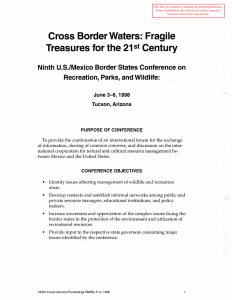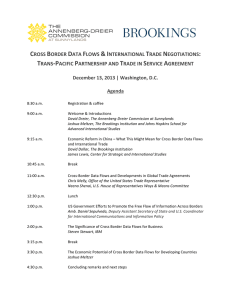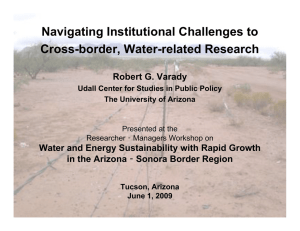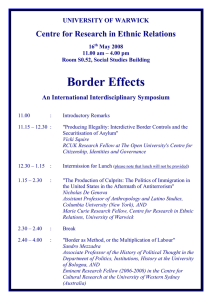10th ANNUAL MINISTERIAL CONFERENCE ON COOPERATION IN THE FIELD OF BORDER
advertisement
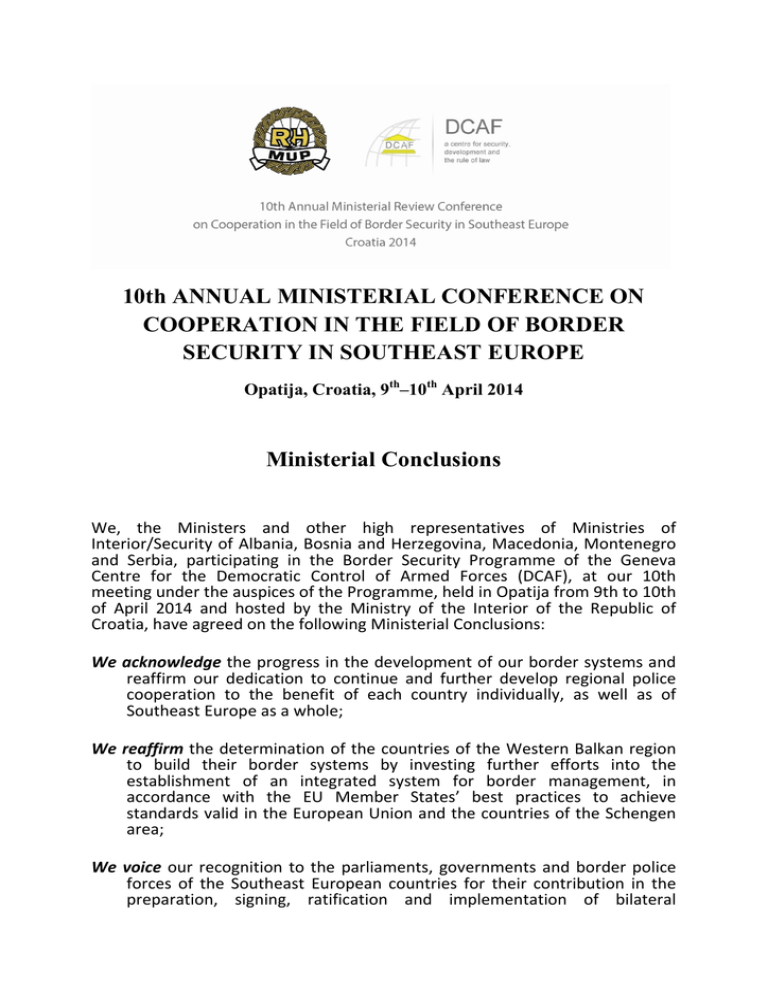
10th ANNUAL MINISTERIAL CONFERENCE ON COOPERATION IN THE FIELD OF BORDER SECURITY IN SOUTHEAST EUROPE Opatija, Croatia, 9th–10th April 2014 Ministerial Conclusions We, the Ministers and other high representatives of Ministries of Interior/Security of Albania, Bosnia and Herzegovina, Macedonia, Montenegro and Serbia, participating in the Border Security Programme of the Geneva Centre for the Democratic Control of Armed Forces (DCAF), at our 10th meeting under the auspices of the Programme, held in Opatija from 9th to 10th of April 2014 and hosted by the Ministry of the Interior of the Republic of Croatia, have agreed on the following Ministerial Conclusions: We acknowledge the progress in the development of our border systems and reaffirm our dedication to continue and further develop regional police cooperation to the benefit of each country individually, as well as of Southeast Europe as a whole; We reaffirm the determination of the countries of the Western Balkan region to build their border systems by investing further efforts into the establishment of an integrated system for border management, in accordance with the EU Member States’ best practices to achieve standards valid in the European Union and the countries of the Schengen area; We voice our recognition to the parliaments, governments and border police forces of the Southeast European countries for their contribution in the preparation, signing, ratification and implementation of bilateral agreements on cross‐border cooperation, and mutual harmonisation of regulations by approximating to the provisions in the European Union legislation; We stress our support for the further implementation of the Police Cooperation Convention for Southeast Europe (PCC SEE) in terms of cross‐ border operational cooperation in the field of border security, the fight against cross‐border and organised crime and illegal migration, and contributing to the implementation of Integrated Border Management; We confirm our utmost support to our aim that all responsible state subjects in the Southeast European countries continue to invest on‐going efforts toward the realisation of the following activities under the Programme: a) to continue, insofar as necessary, with the assistance of the DCAF Working Group on Schengen Integration, to approximate to EU standards and to take over the legislative regulation in accordance with the requirements within the EU accession process via, among other things, the fulfilment of the requirements under the accession Chapter 24, as well as the consequent Schengen integration process; b) to support, in accordance with the internal legislation of all beneficiary countries, the development and use of the web application for self‐ evaluation, which we recognise as a valuable tool for our regular self‐ assessments and for its usability within the processes required for the fulfilment of conditions under the accession Chapter 24; c) to support the implementation of field evaluation visits to the border territories of our countries, modelled upon the EU‐level activities for Schengen evaluation; d) to increase the contribution of the Network of Institutions Responsible for Police Education and Training in Southeast Europe, in accordance with our commonly‐held priorities and needs in the area of Education and Training, and its contribution to fulfilling operational needs, to the foreseen activities of police exchanges, joint trainings, working plans, curricula and publications, along with the strengthening of cooperation with the EU and international institutions active in education and training; e) to contribute to a further merging of expertise and transferring of knowledge in the area of police education and training among our countries as well as with European experts and educators of EU Member States and Switzerland, which shall continue as the annual DCAF summer training camp for police trainers and educators, with the valuable contribution and support of the Swiss Armed Forces; f) to strive toward a common approach in the area of mitigating the negative consequences of irregular migration flows in the Southeast European region, 2 in synergy and complementarity with other relevant EU and international actors, including in the area of common return; g) to continue with the common and coordinated measures of border police forces from all Southeast European countries, as well as common operations at the ‘green border’ sections; h) to organise, in accordance with the internal legislations of the participating countries, other common and coordinated activities provided in the Police Cooperation Convention for Southeast Europe; i) to support the implementation of the Implementation Agreement on a Common Data Management Platform for the Development of a Regional Early Warning System and Risk Analyses – “Border Sentry”, which will enable the formation and functioning of the commonly developed web application for data management; j) to offer full support to the cooperation at the operational level, not only operational cooperation at border crossing points and at the ‘green border’, but also to the resolving of any procedural issues with the aim to enable an unhindered carrying of personally‐owned weapons, uniforms and equipment across the border during an on‐going common operation, as well as ensuring the availability of the necessary equipment to police officials of the countries of the Southeast European region. We confirm our commitment to the following next steps under the Programme, which will ensure a continuous development towards an Integrated Border Management in the Western Balkan region and long‐ term sustainability of achieved results, in view of the common goal to progress towards EU standards and compatibility of instruments: a) to build, in the framework of the realisation of strategic plans and on the basis of the interests on part of neighbouring countries, common infrastructure and facilities accommodating common centres for cooperation, where all subjects responsible for Integrated Border Management (border police, custom and tax authorities) will conduct their business; b) to address the need to achieve a deeper alignment of border systems in the Western Balkan region in technical interoperability, integrated intelligence picture, including the possibility to exchange personal data, and the harmonisation of use of technical and special equipment; c) to address the possible common solutions in the use, planning and procurements of equipment and infrastructure; 3 d) to make common use of the Border Sentry tool in accordance with further defined operational needs under the Programme, taking into consideration the good practices of the EU‐level EUROSUR system; e) to encourage the establishment of common crossing points as cost‐effective solutions, following the existing good practices. We endorse the following goals under the Programme to ensure the long‐term sustainability of the development of modern border management systems in the Western Balkan region, in view of the common goal to progress towards EU standards and compatibility of instruments: a) to share our responsibility in maintaining the existing and future solutions in the development of modern border management in the Western Balkan region; b) by ensuring an active role and sharing the responsibilities of respective countries in the management and facilitation of respective cooperation mechanisms within the operational sphere of the Programme, including the centres for coordination based on EU good practice; c) to grant the border police forces, who have been tasked with the monitoring and evaluation of the Programme so far, with the mandate to prepare for endorsement a joint regional action‐oriented document containing the tasks and executors, including a planned system for monitoring and evaluation, for future endeavours in the development of modern border management systems in the region. We suggest to the international donors to uphold, as a matter of priority, the operational cooperation between the countries of the region aimed at the mitigation of current threats to regional and wider European border integrity, including an effective mitigation of the negative consequences of the migration flows influencing the regional capacities and capabilities to fulfil the requirements of Integrated Border Management as well as the obligations toward the EU related to the Visa Liberalisation for the Western Balkans. * ** 4

